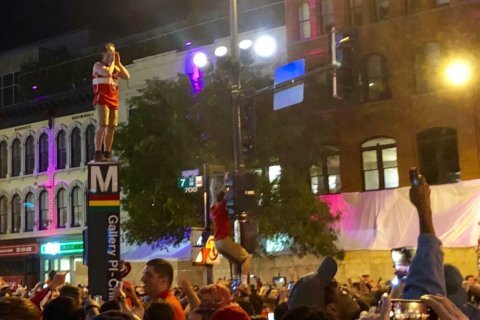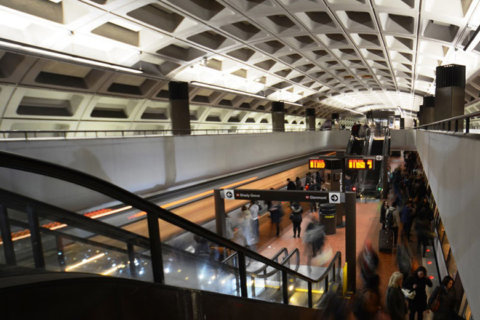WASHINGTON — The region is set to push Congress to give Metro $2 billion over the next decade for critical capital maintenance and upgrades. Officials argue that new dedicated regional funding and related changes to the Metro Board justify an increased federal investment.
The current 10-year promise of $1.5 billion from the federal government — $150 million per year — is set to expire next year. The final installment of that funding is included in House and Senate appropriations bills advancing to final votes, and both the region’s congressional delegation and state-level leaders are now set to turn their attention toward a new 10-year plan.
“One of the options on the table is to raise it to $2 billion because the states — Virginia, Maryland and D.C. — have all committed to the $500 million additional dollars going to capital funding at Metro. Would that be considered our match to an increase?” Virginia Transportation Secretary Shannon Valentine said last week during a visit to the Capitol.
Virginia, Maryland and D.C. already each provide $50 million per year to match the $150 million special federal capital contribution that is unique to the Metro system.
“The commitment from the federal government, as that partner with us, is extremely important,” Valentine said.
Kaine ‘feeling good’
Sen. Tim Kaine, D-Va., is optimistic about an extension.
“I think we’re feeling good about the budgetary commitment, about trying to continue to come up with the next 10-year deal,” Kaine said.
The new Metro Safety Commission, (due to be up and running within a year as required by federal law), also helps, Kaine said.
Any federal funding extension, even at the current level, is expected to support changes at Metro that are already backed at the local level, such as caps on subsidy increases and limits on the participation of alternate Metro Board members in meetings.
The Metro Board is set to adopt operational changes Thursday that would meet those contentious board-reform requirements already included in Virginia’s Metro-funding bill, which was signed into law this spring.
Several Metro Board members are concerned about the disruption to the board and the possible loss of representation for crucial parts of the region in Metro’s decision making.
While Virginia Gov. Ralph Northam said there is always room for tweaks, he said he feels the change is in line with recommendations from former U.S. Transportation Secretary Ray LaHood to cut the size of the board. Northam expects the board changes are here to stay.
The changes simply make clear that “alternates are alternates,” said Valentine, who hopes the changes could make the main board members more accountable by requiring that main board members are assigned to chair and vote on committees.
Based on current appointments, that will require federal safety expert Bob Lauby to relinquish his role as chair of the safety committee.
Alternates’ role would be reshaped
The bylaws the Metro Board of Directors is set to adopt Thursday would still allow alternate members to offer input in public committee meetings and to participate in discussions. But those bylaws would not allow them to be a part of any closed sessions, unless they were in the executive session as a replacement for a main board member.
The changes would also give the Metro Board chair more flexibility in appointing committees, because the current policy of one member each from Maryland, Virginia, the District and the federal government might no longer work with only eight people, rather than the 16 allowed to be appointed to committees. The eight main members were always the only ones who could vote at full board meetings.
New board officer elections have been added to the agenda for Thursday.
The board realignment would take place in July, including new work plans for each committee and an overall strategic plan.
Because much of the overhaul stems from Virginia’s funding bill, Valentine said that she had met with Northern Virginia leaders and Metro Board members (including Chairman Jack Evans), and that she had been speaking with Maryland transportation leaders since the bill passed.
Virginia’s Commonwealth Transportation Board will be responsible for determining compliance with the reforms as required under Virginia law. After a presentation outlining proposed guidelines next week, the board could approve guidelines for that annual determination by September.







